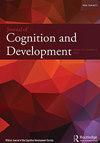米老鼠说的是不可能的吗?特殊事件中的信息提供者现实状态与儿童信仰
IF 2.1
2区 心理学
Q3 PSYCHOLOGY, DEVELOPMENTAL
引用次数: 3
摘要
摘要随着年龄的增长,孩子们能够更好地区分不可能和不可能的陈述,他们意识到不可能的事件可以在现实中发生,而不可能的事情则不能。然而,当孩子们从虚构的实体(例如,儿童媒体中的流行人物)那里听到非同寻常的事件时,他们可能更可能怀疑这些事件是否会在现实中发生。目前的研究考察了举报人的现实状况和熟悉程度如何影响儿童对不可能和不可能事件的陈述的信念。在两项研究中,4岁、6岁和8岁的儿童(N=362)从陌生的人、熟悉的角色或陌生的角色(研究1)或真实或假装的人(研究2)那里听到了不可能和不可能的陈述,并判断每种陈述是否会在现实中发生。与之前的研究一样,年龄较大的儿童比年龄较小的儿童更有可能相信可能发生不太可能的事件。此外,对于这两种类型的陈述,无论举报人是谁,孩子们对事件可能性的判断都是相似的。这些结果表明,当孩子们听到虚构人物描述的非同寻常的陈述时,他们更关注陈述的内容,而不是来源。本文章由计算机程序翻译,如有差异,请以英文原文为准。
Is What Mickey Mouse Says Impossible? Informant Reality Status and Children’s Beliefs in Extraordinary Events
ABSTRACT As children get older, they become better able to discriminate between impossible and improbable statements and they realize that improbable events can occur in reality while impossible ones cannot. However, when children hear about extraordinary events from fictional entities (e.g., popular characters from children’s media), they may be more likely to doubt that the events can occur in reality. The current studies examine how an informant’s reality status and familiarity influence children’s belief in statements about improbable and impossible events. Across two studies, children ages 4, 6, and 8 (N = 362) heard impossible and improbable statements from an unfamiliar person, a familiar character, or an unfamiliar character (Study 1) or a real or pretend person (Study 2) and judged whether each statement could happen in reality. As in previous studies, older children were more likely than younger children to believe improbable events could occur. Additionally, for both types of statements, children’s judgments about the possibility of the events were similar regardless of the informant. These results suggest that when children hear extraordinary statements described by fictional characters, they pay more attention to the content of the statement than to the source.
求助全文
通过发布文献求助,成功后即可免费获取论文全文。
去求助
来源期刊

Journal of Cognition and Development
Multiple-
CiteScore
4.00
自引率
0.00%
发文量
29
期刊介绍:
The Journal of Cognition and Development is the official journal of the Cognitive Development Society (CDS). Some CDS members are concerned with basic research or theory; others focus on policy issues and practical applications. The range of interests includes cognitive development during all stages of life, and we seek to understand ontogenetic processes in both humans and nonhumans. Finally, their interests encompass typical as well as atypical development, and we attempt to characterize both biological and cultural influences on cognitive change and continuity.
 求助内容:
求助内容: 应助结果提醒方式:
应助结果提醒方式:


